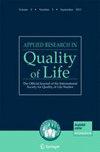Hedonic and Eudaimonic Capital as Tools for Managing Fluctuations in Well-Being Throughout the Voyage of Life
Abstract
What is the human mechanism for coping with expected and unexpected fluctuations in well-being? Psychological and economic theories suggest that possessing non-pecuniary capital promotes emotional resilience and reduces volatility in well-being. By integrating psychological, economic, and financial principles, this paper develops a deeper understanding of non-pecuniary capital’s protective role. The model is based on the notion that savings and diverse capital investments are key elements for coping with both foreseeable and unforeseeable disruptions in well-being. The proper allocation of the time, effort, attention and money sufficient for establishing a buffer against fluctuations in well-being is based on four conditions: (1) Overall well-being consisting of hedonia and eudaimonia; (2) Both components require an individual to be an active producer who invests scarce resources to accumulate both hedonic and eudaimonic capital, each divided into private and collective forms; (3) People act based on both selfish and altruistic motives; and (4) It is important to invest in one’s “authentic inner compass.” The model’s predictions are analyzed for two disruptions that can be expected – retirement from paid work and “empty nest syndrome” – and one unexpected “life quake.” The empirical evidence supporting the model is gathered from international experience.

 求助内容:
求助内容: 应助结果提醒方式:
应助结果提醒方式:


